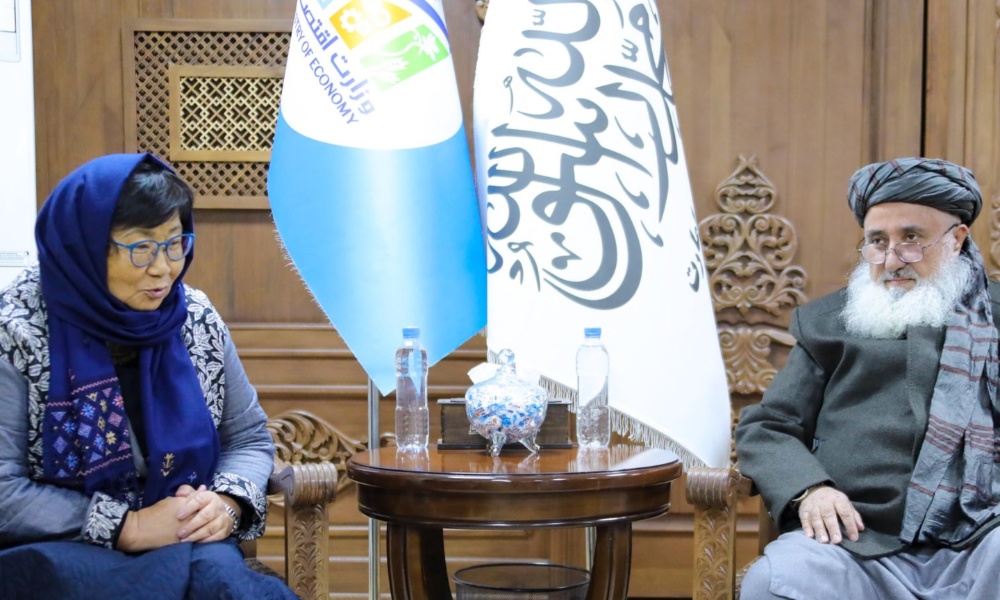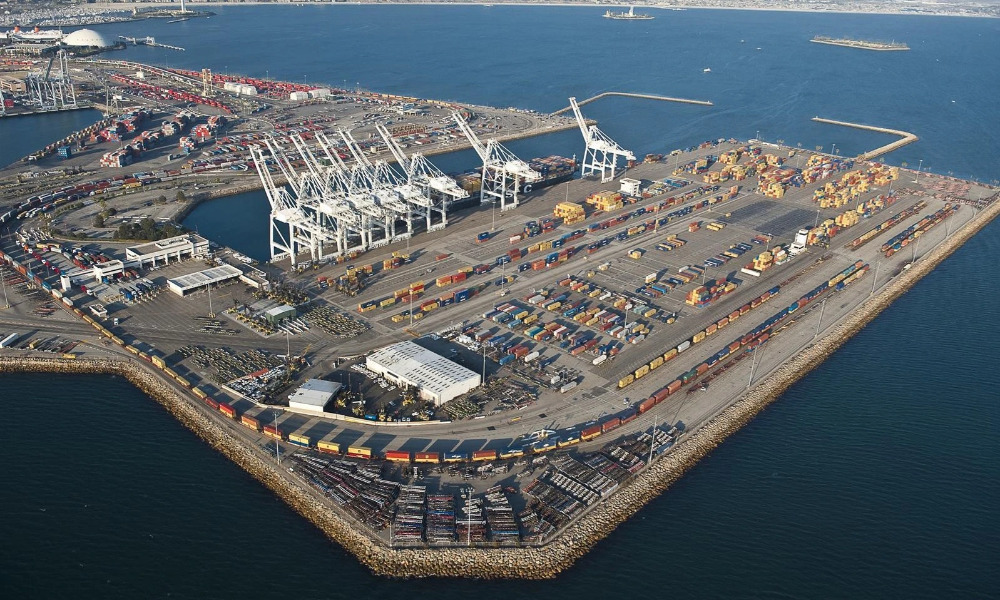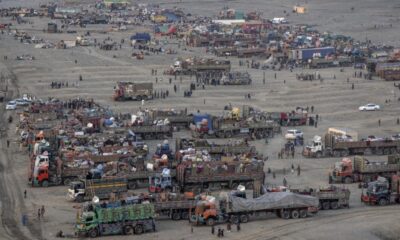Business
UNAMA officials meet with minister of economy, over Afghanistan aid
Afghanistan’s minister of economy said at the meeting that this year, international organizations should focus more on the implementation of development projects

The head of the United Nations Assistance Mission in Afghanistan (UNAMA), along with her deputy, met this week with the acting minister of economy, Din Mohammad Hanif, for discussions around aid.
According to the ministry, the meeting between Hanif and Roza Otunbayeva and Indrika Ratwatte focused on “the effective and transparent adaptation of humanitarian aid in accordance with the economic needs and development priorities of the people”.
Hanif stressed in this meeting that in the coming year, international organizations should focus more on the implementation of development projects and activities in the country in order to solve livelihood problems and reduce the level of poverty and unemployment.
The UN’s World Food Program meanwhile said in its latest report that in December the agency reached 5.9 million vulnerable people with 43,396 metric tons of food and US$18.7 million cash under its general food assistance program.
The agency also said that WFP Afghanistan is only 10 percent funded for the January to June 2025 six-month period, with a net funding requirement of US$652 million.
Business
Exports to Pakistan grind to a halt over faulty scanner at Torkham
Pakistani authorities closed the border to vehicles coming in from Afghanistan after the scanning machine used to track imports developed technical problems.

A faulty scanner on the Pakistan side of Torkham border left goods trucks stranded in Afghanistan this week, Pakistani media reported.
Pakistani authorities closed the border to vehicles coming in from Afghanistan after the scanning machine used to track imports developed technical problems.
Importers in Pakistan told Dawn that both the Afghan and Pakistani authorities allowed only empty trucks stranded on the Afghan side to cross into Pakistan.
This comes after the border crossing was closed for a month due to disputes and clashes between border forces. The crossing only reopened late March.
According to border officials, this is the second time that the scanner developed problems since the reopening of the crossing. As a result exports from Afghanistan to Pakistan ground to a halt. Exports included coal, soapstone, fresh produce and dried fruit.
Frustrated traders have called for the scanning system to be replaced with a modern version in order to resolve trade challenges at the border.
Traders also voiced their frustration over customs tariffs at the border. They said the customs terminal operator, National Logistic Cell, charges Rs8,000 for every truck that crosses, whether it is loaded or empty.
Business
Gold climbs to record high as tariff worries bolster safe-haven demand

Gold’s record run extended to another all-time high on Tuesday, buoyed by safe-haven demand as investors brace for U.S. President Donald Trump’s planned announcement on reciprocal tariffs.
Spot gold was up 0.3% at $3,131.56 an ounce at 0914 GMT, after hitting a record high of $3,148.88 earlier, Reuters reported.
U.S. gold futures were 0.3% higher at $3,159.10.
“Trump’s tariff comments and his increasingly volatile stance on Russia’s war against Ukraine are proving the perfect chaos for new record gold prices,” surpassing even the COVID pandemic five years ago, said Adrian Ash, head of research at online marketplace BullionVault.
Trump said on Sunday his reciprocal tariffs to be announced on Wednesday would include all countries, rather than a limited number.
Goldman Sachs on Monday raised the probability of a U.S. recession to 35% from 20% and said it expected more rate cuts by the Federal Reserve, as Trump’s tariffs roil the global economy and upend financial markets.
Gold, traditionally seen as a hedge against uncertainty and inflation, has risen more than 15% this year. Non-yielding bullion also tends to do well in a low interest rate environment.
“The market is watching April 2 closely for further economic indicators that could impact Federal Reserve policy decisions. If rate cuts are confirmed, this would provide additional support for gold’s upward trajectory,” said Alexander Zumpfe, a precious metals trader at Heraeus Metals Germany.
Bullion’s rally this year has also been supported by strong demand from central banks, geopolitical instability in the Middle East and Europe, and increased flows into gold-backed exchange-traded funds.
In the last session, gold closed out its strongest quarter since 1986, and climbed over $3,100/oz, marking one of the most significant upswings in the precious metal’s history.
Investors will also monitor U.S. job openings data later on Tuesday and the U.S. non-farm payrolls report on Friday.
Silver steadied at $34.06 an ounce, platinum fell 0.4% to $988.35, and palladium gained 0.3% to $985.86.
Business
Efforts underway to expand Afghanistan’s trade relations with India
A number of investors also suggest that the Islamic Emirate should actively participate in regional and trade fairs to increase exports, so that Afghan products can be marketed in regional and global markets.

The Ministry of Industry and Commerce says that efforts are underway to expand trade relations with India, the volume of which reaches $650 million annually.
Abdulsalam Jawad Akhundzada, a spokesman for the Ministry of Industry and Commerce, says that India is also interested in expanding trade relations with Afghanistan, and Kabul has also taken steps in this regard by using Chabahar Port, and talks have been held with the Indian side on visas.
The Chamber of Commerce and Investment also says that trade relations between Afghanistan and India are expanding and these relations are strengthening with each passing day. According to officials of the chamber, Afghanistan has exported goods worth $500 million to India in the past year.
A number of investors also suggest that the Islamic Emirate should actively participate in regional and trade fairs to increase exports, so that Afghan products can be marketed in regional and global markets.
According to investors, once the visa issues with India are resolved, a large portion of the country’s fresh and dried fruits will be exported to India because India is a good market for Afghan fruits in the region.
Investors want the Islamic Emirate to pave the way for increased exports to India through Chabahar Port.
-

 Health5 days ago
Health5 days agoGlobal organizations warn of health crisis due to aid cuts in Afghanistan
-

 World4 days ago
World4 days agoMyanmar quake death toll hits 1,700 as aid scramble intensifies
-

 Sport4 days ago
Sport4 days agoIPL 2025: Gujarat Titans beat Mumbai Indians by 36 runs
-

 Latest News3 days ago
Latest News3 days agoSwitzerland re-establishes presence in Kabul with humanitarian office
-

 Latest News3 days ago
Latest News3 days agoPakistan plans to expel 3 million Afghan refugees this year
-

 World3 days ago
World3 days agoSouth Korea, China, Japan seek regional trade amid Trump tariffs
-

 Regional3 days ago
Regional3 days agoIran’s Khamenei warns of ‘strong’ response if US attacks
-

 Latest News4 days ago
Latest News4 days agoUS citizen detained in Afghanistan has been freed
























